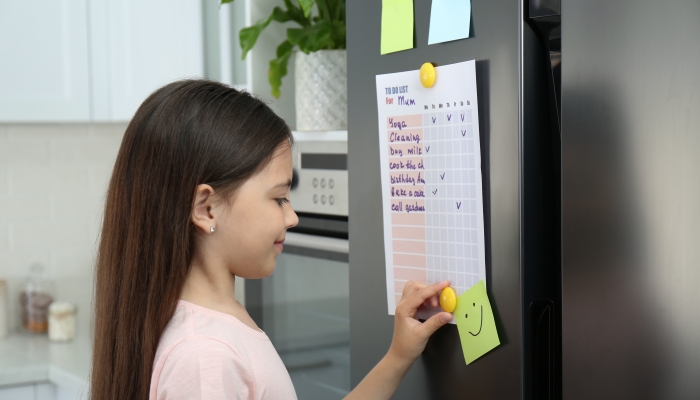7 Ways To Stop Your Child’s Perseveration

- Perseveration is usually associated with specific neurological disorders like ADHD, traumatic brain injuries, or autism.
- Children with perseveration tend to get stuck on questions or behaviors and keep repeating themselves after it’s necessary.
- A child with perseverating behavior may have difficulty adapting to new social situations or be unable to switch tasks easily.
Does your child tend to ask the same question repeatedly or lack specific social skills you notice in other children? While it’s normal for children to be curious, perseveration goes one step further, leading them to a repetitive state.
Perseveration is an inability to get away from a specific topic or idea, like getting stuck on the same question. Children with preservation behavior don’t do it to be stubborn or defiant; instead, they likely have a neurological or psychological condition leading to the behavior.
Perseveration has the potential to lead to disruptive behavior; however, with the proper support and treatment, you can help manage your child’s condition and improve their quality of life.
1. Identify Triggers

One of the best ways to stop your child’s perseveration is to identify, discuss, and observe specific triggers. I firmly believe in letting your child be who they are; however, perseveration can lead to undesirable behavior, affecting them long-term.
When you understand what causes specific behavior, you can help stop it before it significantly affects your child. For example, if you know your child gets overwhelmed in crowded places, talk to them beforehand about the environment you’ll be in, especially if it leads to repetition. (A child may ask questions repeatedly about where you are or who you are with).
While they may still struggle, each conversation you have with your child can help them overcome a specific challenge they generally face. It’s also a great idea to keep a journal or log to track triggers over time to understand better what triggers your child’s behavior
2. Create a Structured Environment and Implement Time Limits

A predictable routine can make all the difference for a child with perseveration, and you may see a shift in how they respond to certain situations. If your child gets stuck on everyday tasks because they aren’t consistent, consider creating a visual schedule and hanging it on the refrigerator.
Examples of structured schedules and environments include:
- Sensory-friendly spaces (i.e., weighted blankets, fidget toys, etc.)
- Structured learning environments
- Transition supports (i.e., visual countdowns, transition objects, etc.)
- Plan structured activities
- Visual daily schedule
When you offer a structured schedule and environment, you help provide your child with predictability and consistency.
3. Use Visual and Verbal Cues

Consider using visual schedules or timers to help manage transitions and reduce perseverative behavior. For example, draw a picture or post a graphic reminder for your child that they can refer to and feel satisfied with the answer they want.
If your child struggles with leaving an activity or place, use simple, clear verbal cues to signal an end to what you are doing. In addition, it’s always a good idea to give your child a countdown before you leave somewhere. If you plan on leaving at 3:00 pm, start giving them a countdown at 2:30 pm, so they aren’t surprised when it’s time to go.
If your child is stuck on a subject, tell them you’ll set a timer for 10 minutes. When the timer goes off, it’s time to move on to another topic. While change won’t happen overnight, you’ll be surprised at the result if you are consistent.
4. Teach Coping Strategies

It’s not easy dealing with repetitive and intrusive thoughts, but you can help your child as they perseverate. Remember, a simple task for you may seem challenging to your child.
For example, if your child tends to get stuck on specific topics and is forced into repetition mode, take time to teach them coping strategies to help them handle frustration and overstimulation.
While it won’t necessarily happen overnight, you may notice a difference in their thinking as they incorporate coping strategies into their daily routine.
Examples of effective coping strategies include:
- Deep breathing
- Sensory break
- Using positive self-talk
- Retreat to a safe space or sensory corner
- Provide sensory support
- Establish routines
Sensory-seeking behavior is typical in persevering children, so offering structured sensory activities can help them when they feel overwhelmed or stuck.
After your child exhibits perseveration behavior, talk to them about getting stuck and your perspective on the situation while it occurs. While showing empathy, you can discuss with them ideas on how to better deal with uncomfortable situations that may be causing stress or anxiety.
5. Use Positive Reinforcement

Positive reinforcement is necessary when recognizing and rewarding efforts to reduce or manage preservation. You may want to consider creating a reward chart to visualize your child’s progress, which will also give you a sense of how they cope.
For example, you can add a sticker each time your child gets stuck on a topic but works their way through it. Once they get five stickers, they can pick a reward. Remember, you can consistently offer verbal praise, regardless of how many stickers they have!
Examples of appropriate rewards include:
- Extra time doing their favorite activity
- Offer a preferred food or snack
- Watch a movie
- Go out for ice cream
- Trip to the dollar store
You may have to experiment with positive reinforcement rewards depending on their response and to determine what works best for your child. In addition, ensure you are consistent with rewards and consequences and adjust your reward system as needed.
6. Practice Patience and Understanding

It’s essential to remain patient and offer unconditional support for children who experience perseveration. Since preservation is frequently caused by anxiety and stress, it’s best to stay calm and offer empathy while showing your support.
For example, try seeing things from your child’s perspective, celebrating progress, regardless of how small, and ensuring they aren’t in trouble. Sometimes, a shift in perspective makes all the difference.
7. Ignore the Behavior

Ignoring certain behaviors is not my strong suit. Sometimes, I feel my brain can’t tune out my kids as much as I try. However, if your child is repetitive and can’t break the cycle, you may ignore their behavior.
If ignoring worsens the situation, you may distract them with something they love. For example, if your child has a favorite book, suggest you read it together when they are exhibiting perseverating behavior.
It’s important to mention that you may find a reason to intervene if you worry about your child’s perseveration behavior. A person who perseverates frequently can’t control their behavior and may need assistance.
Remember, you aren’t a failure if your child doesn’t have the behavior social media thinks they should have. (That’s all fake, anyway!)
Causes of Perseverating in Childhood
Understanding the causes of perseveration in early childhood can help you handle the situation when it arises. In addition, it’s essential to realize that perseveration is different than obsessions, like obsessive-compulsive disorder, which is more severe and in line with mental health conditions.
However, if you are concerned about your child’s behavior and symptoms persist, you should consult your pediatrician, who can help you decide on the best next steps.
According to Children and Adults with Attention-Deficit/Hyperactivity Disorder11. Skolnick, J.. Giftedness & ADHD: A Strengths-Based Perspective and Approach. CHADD. https://chadd.org/attention-article/giftedness-adhd-a-strengths-based-perspective-and-approach (CHADD), gifted children may perseverate to the point of paralysis due to the need for perfectionism.
Potential causes of perseveration in childhood include:
- Depression/anxiety
- Trouble with social cues
- Autism
- Trauma
- Brain injury
- Intensity
- Stress
Remember to remain patient with your child, even if you think their questions or responses seem unreasonable.
FAQs
What are the long-term effects of unmanaged perseveration in children?
Kids with long-term perseveration may experience social challenges, academic difficulties, and increased anxiety and stress. While perseveration can interfere with daily functioning, you can develop strategies and encourage your child’s strengths by promoting flexibility and adaptive skills.
What are some mistakes to avoid when trying to stop a child’s perseveration?
If your child tends to perseverate, you don’t want to come across as the enemy. Mistakes to avoid when trying to stop a child’s perseveration include:
- Having a desire to “win” the battle
- Don’t discredit their statements
- Don’t repeat yourself in the conversation
If your child isn’t responding well to your words or has difficulty adapting, take a step back and consider how you phrase what you’re asking them.
When is the time to seek professional help for my child’s perseveration?
If your child is struggling with perseveration, you may consider seeking professional help, including your pediatrician or a psychiatrist, to diagnose the condition. In addition, if your child is anxious or depressed because of their behavior, it’s essential to take the proper steps to get them the help they need.
References
- Skolnick, J. (n.d.). Giftedness & ADHD: A Strengths-Based Perspective and Approach. CHADD. https://chadd.org/attention-article/giftedness-adhd-a-strengths-based-perspective-and-approach

Related Posts

Autism
Developing Time Management Skills in Children with Autism: 7 Tips
Learn how you can use structure and visual aids to help your child with autism learn time management skills.

Autism
Occupational Therapy for Children with Autism: How It Can Make a Difference
Children with autism face challenges in many different areas. Occupational therapy can help children address these difficulties while having fun!

Behavior
Understanding Intermittent Explosive Disorder in Children
Are you worried about your child’s unexpected aggression and explosive behaviors? Learn how to support a child with intermittent explosive disorder.